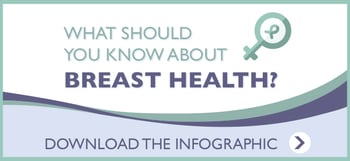 The majority of women experience breast pain, also called mastalgia, at some point in their lives. Although this type of pain can by worrying, it is not generally a sign of breast cancer. More commonly, breast pain is associated with the menstrual cycle, often occurring a week or so before the beginning of the cycle. It can also be a result of other hormonal changes,[1] of benign breast conditions that may require treatment,[2] or of taking some types of medications.[3]
The majority of women experience breast pain, also called mastalgia, at some point in their lives. Although this type of pain can by worrying, it is not generally a sign of breast cancer. More commonly, breast pain is associated with the menstrual cycle, often occurring a week or so before the beginning of the cycle. It can also be a result of other hormonal changes,[1] of benign breast conditions that may require treatment,[2] or of taking some types of medications.[3]
Breast Pain
Cyclical Pain
Breast pain is most commonly cyclical, occurring at regular times of the month. This may be simply a result of hormonal changes associated with the menstrual cycle. Elevated estrogen levels during perimenopause can intensify premenstrual breast soreness.[4]
Cyclical mastalgia can also be the result of normal fibrocystic changes. Over half of women experience this type of change during their lifetimes. The breast tissue becomes lumpy or ropelike and can be tender, especially right before menstruation.[5]
Non-Cyclical Pain
Benign Conditions
- Puberty: Girls often experience pain when their breasts begin to develop.[6] Because boys also undergo hormonal changes during puberty that often cause breast changes, they may also have breast pain during this time.[7]
- Pregnancy: It is common for breasts to feel tender, especially during the first trimester. For many women, this may be the first sign of pregnancy.
- Engorgement: It is normal for a woman’s breasts to feel full and tender a few days after childbirth as her milk comes in. She may also experience engorgement if she does not nurse or pump frequently. Because infrequent or declining feeding frequency can also lead to mastitis, it is important to be alert to signs of infection.[8]
- Mastitis: Mastitis is an infection of the breast that is most common in nursing mothers, although it can affect women who are not breastfeeding. Mastitis may cause the breast to feel tender, sore, and warm to the touch, and the skin may appear red. It is often accompanied by fever, chills, and/or feeling run down. Because untreated mastitis can lead to abscess, women with these symptoms should consult their health care providers for diagnosis and treatment.[9]
- Referred pain: Some conditions can cause pain that feels like it is in the breast but actually originates elsewhere. Costochondritis, inflammation of the cartilage connecting the ribs to the breast bone is one such condition. Pinched nerves and back conditions can also cause pain that is perceived in the breast.[10]
- Medications: Some medications, inclucing digitalis preparations, methyldopa, spironolactone, chlorpromazine,certain diuretics, and Anadrol, are known to correlate with increased breast pain.[11]
Inflammatory Breast Cancer
Non-cyclical mastalgia is sometimes associated with inflammatory breast cancer. This type of cancer is rare, however, representing only 1-5% of breast cancers diagnosed in the U.S. Inflammatory breast cancer usually produces other distinct symptoms, which may include swelling and redness that affects at least 1/3 of the breast, skin that appears ridged or pitted, similar to an orange (called peau d’orange), sudden increase in breast size, a feeling of heaviness in the breast, an inverted nipple, or swollen lymph nodes under the arm or around the collarbone.[12]
When to Consult Your Health Care Provider
If you are worried about your breast pain, consult your health care provider. She or he will perform a physical exam and recommend any diagnostic testing that is indicated. Also contact your doctor if you experience any of the following symptoms:
- Signs of infection, including fever, chills, pus, localized redness, fever, or a breast that feels unusually warm to the touch
- Bloody or clear discharge from the nipple
- A new lump that occurs with the onset of pain and that does not go away after menstruation
- Persistent, unexplained breast pain[13]
- Pain that seems to get worse over time
- Pain that interferes with daily activities[14]
Breast pain is very common and usually not a sign of cancer. The most important way to detect breast cancer in its earliest stages is to get annual screening mammograms after your 40th birthday. If you are concerned about your breast pain, however, or if you experience any of the symptoms indicated above, consult your health care provider.
For more information about what you need to know about breast health, download our free infographic.
The health-related information on the Iowa Radiology website is meant for basic informational purposes only. It is not intended to serve as medical advice or to be used for diagnosing or treating a disease. Users of this website are advised to consult with their health care providers before making any decisions concerning their health.
Sources
[1] http://www.nationalbreastcancer.org/breast-pain
[2] http://www.cancer.org/cancer/news/features/breast-cancer-symptoms-what-you-need-to-know
[3] http://blog.harvardvanguard.org/2013/01/should-i-be-worried-about-breast-pain/
[4] http://www.bcmj.org/article/clearing-confusion-about-perimenopause
[5] http://www.mayoclinic.org/diseases-conditions/fibrocystic-breasts/basics/definition/con-20034681
[6] http://kidshealth.org/teen/sexual_health/girls/sore_breasts.html#
[7] http://www.cyh.com/HealthTopics/HealthTopicDetailsKids.aspx?p=335&np=289&id=2233
[8] http://www.llli.org/llleaderweb/lv/lvmarapr93p19.html
[9] http://www.mayoclinic.org/diseases-conditions/mastitis/basics/definition/con-20026633
[10] http://blog.harvardvanguard.org/2013/01/should-i-be-worried-about-breast-pain/
[11] http://www.nationalbreastcancer.org/breast-pain
[12] http://www.cancer.gov/cancertopics/factsheet/Sites-Types/IBC
[13] http://www.nationalbreastcancer.org/breast-pain
[14] http://blog.harvardvanguard.org/2013/01/should-i-be-worried-about-breast-pain/


